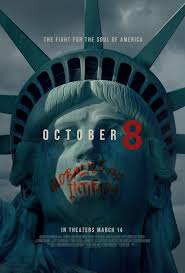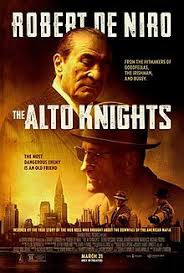Displaying items by tag: Debra Messing
October 8

OCTOBER 8
US, 2025, 100 minutes, Colour.
Directed by Wendy Sachs.
The 1983 moviie, The Day After, focused on the aftermath of nuclear war. The title of this film, October 8, is also the day after, the Hamas attack on Israel, the massacre, the hostages.
The timeframe for this documentary is October 7 until October 2024. With the ongoing invasion of Gaza, the continuing role of Hamas in the peace negotiations, the numerous deaths in Gaza, especially women and children, the allowing and then the forbidding of food trucks, international diplomacy…, one of the interviewees actually mentioning this towards the end of the film, there is the challenge to the audience of 2025 and later, to look at the wider perspectives.
However, this film is particularly focused, written and directed by Wendy Sachs, one of the producers being prominent actress, Debra Messing, who introduces the film to the wide American audience and beyond. And the focus is on the consequent anti-Semitism in the United States, especially on prominent university campuses in the aftermath of October 7.
There is a wide range of talking heads for the documentary, especially Jewish students (from a range of ethnic backgrounds), political commentators, political representatives, many impassioned speeches.
As it should, the film highlights the horror of the Hamas attack, many clips included, the numbers killed, their ordinary backgrounds, the hostages taken. And, there are many photos of the hostages as well as some interviews with friends and relatives. During the film, there is no mention of the Israeli government, of the attack on Gaza, no mention of Benjamin Netanyahu and his supporters and his motivations, his political career as well as the eradication of Hamas. These issues will arise in any discussion about this documentary.
But, what is emphasised is the prevalence of anti-Semitism, memories of the establishment of the state of Israel, the treatment of Palestinians, the bases for some anti-Semitism. However, there are frightening sequences of public protests and demonstrations, vicious statements and, especially in these days of social media, brutal and hostile criminal threats.
The film also highlights the response of heads of universities in dealing with the demonstrations on the various campuses, including Cornell, Harvard, Santa Barbara. Some of the presidents of the universities are seen in Senate hearings, the critique being that they did not deal properly with the anti-Semitism and the violence. Some later resigned.
For Jewish audiences, the Zionist audiences, this is an important reminder of the experience of anti-Semitism, especially in the United States, during 2024. It raises images and memories of past anti-Semitism, especially by the Nazis and the Holocaust.
For non-Jewish audiences, it is a challenge, to check bases for opinions, to check how well informed we actually are about Israel, anti-Semitism, the role and fate of the Palestinians since 1948, the various uprisings.
In 2025, after the events shown in this documentary, the world, the United Nations, have had to face the increasing number of deaths, the number of world organisations and some countries accusations of genocide against the Netanyahu government, the images of death, injuries, destroyed buildings, hospitals, Palestinians continually on the move, the long prevention of entry of food trucks into Gaza in early 2025…
And the long delays in returning hostages and the bodies of hostages.
Not last words or images, but words and images that need to be reflected on, discussed with truth, honesty, reconciliation.
Alto Knights,The

THE ALTO KNIGHTS
US, 2025, 125 minutes, Colour.
Robert De Niro, Debra Messing, Kathrine Narducci, Cosmo Jarvis, Michael Rispoli.
Directed by Barry Levinson.
Revisited. The Mafia revisited.
Over 50 years ago, worldwide audiences became powerfully aware of the Mafia and its activities in the United States with the release of Francis Ford Coppola’s The Godfather. For the next half century and more, there have been many, many Mafia films, organised crime dramas, especially with the intensity from Martin Scorsese, the 30 years from Goodfellas to The Irishman. Cinema audiences have been fine-tuned to responding to these films for a long time.
Which puts The Alto Knights to some disadvantage, high expectations from audiences. And, there is the Robert De Niro connection, his first Oscar for portraying the young Vito Corleone in The Godfather 2, then with Scorsese, Goodfellas, Casino, The Irishman. More expectations.
Another factor is that this film has been made by Hollywood veterans, Robert De Niro, and director, Barry Levinson, in their 80s. Writer, Nicholas Pileggi (famous journalist investigating crime in the 1950s, writer of Goodfellas and Casino) and longtime prolific producer, Irwin Winkler, both in their 90s. This is very much a film in retrospect, of interest to audiences who have focused on Mafia films, perhaps not striking enough for audiences who have seen most of it before.
The casting director has obviously made great attempts to give the look of authenticity with so many of the supporting cast playing gangsters having strong Italian names.
One of the great attractions for this film is that Robert De Niro plays the two Mafia chiefs of the 1940s and 1950s, Frank Costello and Vito Genovese. And, while he shows that they have a great deal in common, their childhood friendship in the club The Alto Knights, they also fell out and there are considerable differences, Frank Costello, generally calm and calculating, Vito Genovese more of a psychopath. (And, as we watch De Niro as Genovese, he often looks as if he is channelling performances by Joe Pesci in such films as Goodfellas).
In some ways, this film is a vindication of Frank Costello and the condemnation of Genovese. It is narrated by Costello, a quiet mastermind in organising rackets, starting with bootlegging during Prohibition, building up a network, and establishing a facade of respectability, aided by his devoted wife of almost 40 years, played strikingly and unexpectedly by Debra Messing.
The main action of the film takes place in the immediate aftermath of World War II, Genovese returning from years in Sicily after fleeing murder charges in the US, determined to be the boss, eventually putting a contract on Costello which fails, and a climax with the drama of the meeting of all the Mafia chiefs at the Appalachian rendezvous, Costello masterminding again, the police swooping, Mafia chiefs to jail, including Genovese who died there.
A subdued postscript as Costello retires with his wife, cultivating roses, winning a competition, quietly complacent as he dies with his criminal life achievement.
- The title and tone? The old club for young Italians in New York City?
- The place of gangster films about the Mafia in American cinema, from the 1970s with The Godfather, so many films through the decades, the influence of Martin Scorsese? The presence of Robert De Niro?
- Writer, director producer, star, their careers over the decades, now in their 80s and 90s, the perspective? Gauging the potential audience, older audiences, younger?
- The device of having Robert De Niro play the two central characters? His skills, differentiating the personalities, some confusion for audiences?
- The focus on Frank Costello, how well-known from of the gangster films, his narrating the story, audience sympathy for him, his explanation of himself, the flashbacks and photos, the footage from the period, Prohibition, bootlegging, his establishing himself, the rackets, continuing into the 1940s, the friendship with Vito Genovese, the break, Vito Genovese and the murder charges, to Italy, absent during World War II, his return? Friendship, rivalries, competition? The attempt on Frank Costello’s life, the wound, his surviving, in hospital, released, the police questioning, his saying he did not see the shooter? 38 years of marriage, his devotion to his wife, her support?
- Frank Costello, criminal, respectability, works of charity? His wife? Her charm and personality, Jewish background, flashbacks to their meeting, dancing, wedding? The effect of the attempt on Costello?
- De Niro as Vito Genovese, in the Joe Pesci style of performance, intense, psychopath? His past, the murders, exile, return, his close friends and their continued support, advice? Rivalry with Frank Costello, giving the order, Vincent, the shooting, his failure, the return, the rebukes, hs continuing to work for Vito Genovese the? Chauffeur?
- The flashbacks about Vito Genovese? Anna, the club, her personality, Vito and his intervention, marriage, the romance, falling out, his intervention to get the money, the confrontation, her boyfriend? His later being shot? The importance of the divorce court proceedings, her incessant talking, his nonchalant attitude, denials, alleging respectability? The granting of the divorce? The consequences? Anna and her continued phone calls to Bobby Costello?
- Kefauver and the politicians, the atmosphere of the 50s, against crime and communists? Performer on the television show? Publicity, for those combating organised crime? The hearings, Vito Genovese and the others all taking the fifth, No Comment. Mentioning Costello, his tactic of Costello offering to come, and some questions, the challenge, his declaring he was an ordinary citizen and walking out?
- Costello’s plan to defeat Vito Genovese? The promise to hand over the leadership of the Mafia families, the arrangement of the meeting, the location in the appellations, the farm setting, the invitation going out, everybody turning up, the cars, the farm, the welcome by the locals, meal and the celebration?
- The background of Costello and Albert Anastasio, bodyguard and support, the plan for him to go to Cuba, Vito Genovese puzzling, the hit, the death in the arber’s salon? Costello’s reaction, Albert’s wife and family Bobby Costello’s support?
- Costello and his driver, delaying going to the meeting, stopping for coffee, buying apples, supplying the information?
- The police patrols, more police binoculars, calling in, the number plates, young man checking cars in the mud, his informing the group, the panic, everybody running everywhere, , rounding them up, the arrests? The consequent prison sentences, and Vito Genovese in dying in jail?
- The aftermath, Costello talking about respectability, growing flowers, his wife’s support, winning the competition, and finally dying quietly?
- Another chapter in American Mafia history?